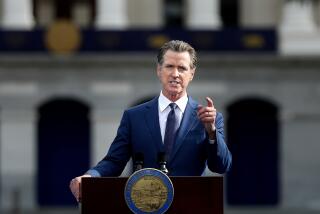A panel with a budget mission
- Share via
The federal government took a tentative step toward solving its long-term budget problems Thursday when President Obama issued an executive order creating the National Commission on Fiscal Responsibility and Reform. How much the commission can contribute to the solution, however, will depend on the calculations of the two major political parties. Today’s record-setting deficits are a campaign issue that Republicans may be reluctant to give up. And the heavy lifting involved in closing the long-term budget gap is something that few members of either party seem willing to do.
Obama’s action came three weeks after the Senate blocked a proposal that would have created a considerably more powerful commission -- one whose recommendations would have gone automatically to Congress for a vote. Top Republicans opposed that approach, arguing that it was a ploy by Democrats to raise taxes instead of cutting spending. Some conservatives offered a similar criticism about the commission Obama created Thursday. Some liberal economists, meanwhile, complained that the concern about red ink was misplaced. The current $1.5-trillion deficit, they argue, is a predictable consequence of the deep recession and will fade in importance as the economy improves.
If nothing else, the commission will help identify for Americans which long-term problems they should really be worried about. Getting employment back to normal levels will boost tax receipts and reduce demand for government services, shrinking the deficit considerably. But Medicare, Medicaid and Social Security spending will continue to grow at an unsustainable rate, driven higher by healthcare inflation and the growing population of retirees. Without further corrective action, those problems will eventually dwarf today’s troubles.
We wish Congress and Obama had the political courage to take on these issues themselves instead of handing off the job, but that’s not happening. At least the commission has a deadline -- Dec. 1 for its recommendations on how to stabilize the deficit within five years -- and a requirement that its recommendations be supported by a bipartisan supermajority.
It’s too bad that Obama didn’t give the panel more ambitious marching orders; its mission is to “meaningfully improve” the long-term budget gap, not to close it. Nevertheless, it’s a start. Now, to demonstrate his support, Obama should pledge to incorporate the commission’s recommendations into his future budget proposals. That doesn’t guarantee that Congress will adopt them, but it least it ensures that the commission’s work won’t be ignored.
More to Read
Get the L.A. Times Politics newsletter
Deeply reported insights into legislation, politics and policy from Sacramento, Washington and beyond. In your inbox twice per week.
You may occasionally receive promotional content from the Los Angeles Times.







